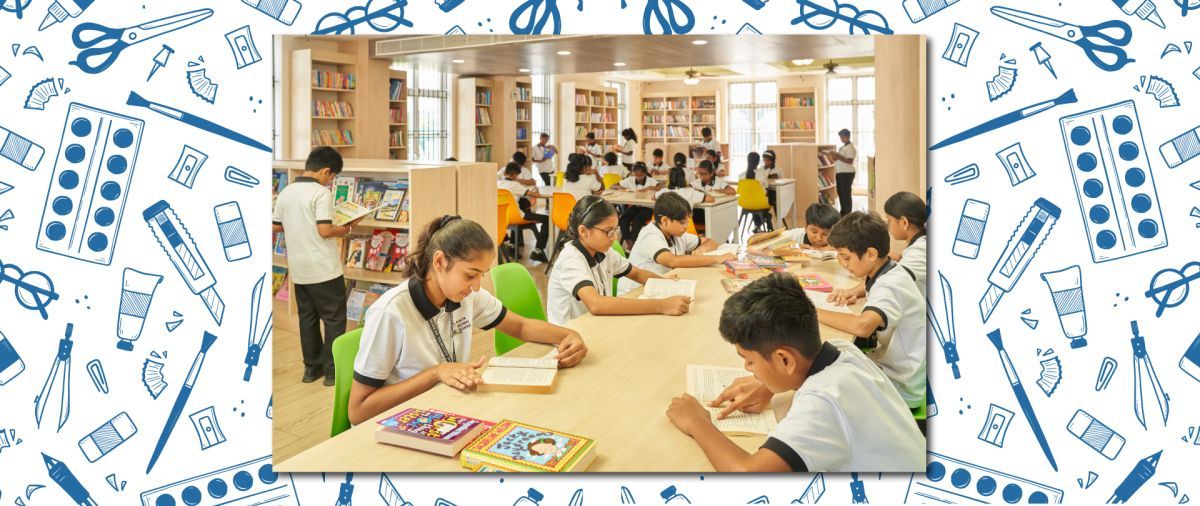Living in India, you probably would have heard about the CBSE board in some way or another. Its popularity in the country is such that it creates stimulating conversations among people on the board's effectiveness and its distinctive curriculum. Whether it has become a dinner table conversation for your family contemplating if it is a sensible choice for your kid or if you are someone wanting to understand “What is CBSE?” with all its nuances, our blog decoding everything about CBSE, will be of great help to you. All your questions such as “What is CBSE board?”, “What is the full form of CBSE?” and “How does the CBSE grading system work?”, will be addressed in this blog one by one, so stay tuned till the end.
Admissions for 2025-26 are now open at AGS Anna Nagar and Ayanambakkam. Enrol today!
What is the Full Form & Meaning of the CBSE Board?
The full form of the CBSE board is the Central Board of Secondary Education managed and regulated by the Indian Union Government. The meaning of the CBSE board is that it is a national-level board of education for both private and public schools in India responsible for conducting examinations for classes 10th and 12th as well as prescribing the syllabus and curriculum for affiliated schools. Established to ensure quality education across the country, CBSE stands for the Central Board of Secondary Education, emphasising its role in overseeing secondary and higher secondary education standards in India.
Having understood the meaning of CBSE, are you wondering which is the best school for CBSE in Chennai? If yes then, Aachi Global School is the best CBSE school in Chennai, India to exceed all your expectations in offering a high-quality CBSE curriculum and helping students prosper in future in their field of passion.
Historical Details & Information of CBSE - Central Board of Secondary Education
In 1921, India witnessed the establishment of its first educational board, the Uttar Pradesh Board of High School and Intermediate Education, marking a significant milestone in the organisation of secondary education in the country. Initially, under the governance of Rajputana, Central India, and Gwalior, this board laid the groundwork for standardised education practices.
Progressing further, in 1929, the Indian Government took a monumental step towards inter-state collaboration in secondary education by passing a resolution for the creation of a joint board. This collaborative effort resulted in the formation of the Board of High School and Intermediate Education, aimed at fostering cohesion and uniformity in educational standards across regions.
Finally, in 1952, the culmination of these efforts led to the official establishment of the Central Board of Secondary Education (CBSE), consolidating diverse educational initiatives into a singular authoritative body. This transition marked a pivotal moment in Indian education, streamlining curriculum development, examination processes, and educational policies under a centralised framework, thus shaping the landscape of secondary education in India.
What is the CBSE Syllabus?
The CBSE syllabus encompasses a comprehensive range of subjects designed to provide a well-rounded education to students across various stages of schooling. It typically includes core subjects such as Mathematics, Science, Social Science, English, and Languages, along with elective subjects like Computer Science, Economics, Political Science, and others depending on the grade level. The syllabus of CBSE is structured to promote holistic learning, critical thinking, and the practical application of knowledge. It undergoes periodic revisions to incorporate contemporary developments and align with global educational standards, ensuring that students receive relevant and up-to-date content. Additionally, the CBSE syllabus often integrates co-curricular activities, value-based education, and skill development initiatives to foster the overall development of students.
Looking for a good CBSE school in India for your child? Look no further! Aachi Global School is one of the top CBSE schools in India offering education and training to be at par with the global standards of education.
Roles & Objectives of the CBSE Board
- Develop stress-free, inclusive, and child-friendly academic methods while maintaining academic rigour.
- Monitor and diversify educational activities based on stakeholder feedback to ensure inclusivity and effectiveness.
- Propose initiatives aligning schooling practices with national educational goals and priorities.
- Conduct capacity development programs to enhance the skills and competencies of teachers.
- Determine examination requirements and formats for Class 10 and Class 12 final exams, ensuring fairness and quality.
- Enable comprehensive student development by integrating co-curricular activities, fostering values-based education, and implementing skill enhancement programs.
Just like finding the right board, finding the right school for your child is a daunting task to handle as a parent. Read our blog on how to choose a school for your child in India and make a sound decision for your kid’s future.
CBSE Regional Office in India
CBSE - Central Board of Secondary Education regional offices are spread throughout the country in various places to ensure the smooth functioning and maintenance of the system. These regional offices serve as administrative hubs responsible for implementing CBSE policies, conducting examinations, coordinating with affiliated schools, and addressing the educational needs of students.
Some of the prominent regional offices of CBSE in India include:
- Delhi
- Chennai
- Guwahati
- Ajmer
- Panchkula
- Allahabad
- Bhubaneswar
- Patna
- Thiruvananthapuram
- Dehradun
Eligibility Criteria for CBSE Examination
Here are the CBSE board details & information for the eligibility criteria for examination for both students & teachers:
- Class 10 (AISSE) and Class 12 (AISSCE) Examinations:
1. Only students enrolled in CBSE-affiliated schools are eligible to appear for the Class 10 AISSE and Class 12 AISSCE exams.
2. Students must fulfil attendance and academic performance requirements as specified by their respective schools to be eligible for these exams. - National Eligibility Test (NET) for Teacher Recruitment
Let your child fall in love with learning with Aachi Global School - The best school for CBSE.
Examinations Conducted by the CBSE Board
- Class 10 and Class 12 Final Exams: CBSE administers annual final exams for students in classes 10 and 12, assessing their academic performance and knowledge.
- Joint Entrance Examination (JEE)
- National Eligibility cum Entrance Test (NEET)
- Central Teachers Eligibility Test (CTET)
- National Eligibility Test (NET)
Advantages of CBSE Board
- Government Recognition:
CBSE, Central Board of Secondary Education is nationally recognised by the Indian government, ensuring adherence to government-established guidelines and curriculum standards. - Simplified Examination Method:
CBSE employs a systematic approach to examinations, allowing students to take only one exam per subject, reducing unnecessary stress and fostering genuine interest in learning. - Comprehensive Syllabus Structure:
CBSE syllabus is designed to prepare students for various entrance exams like IIT-JEE and AIIMS, aligned with NCERT standards across all subjects. - Facilitates Relocation:
CBSE's affiliation with numerous schools in India enables seamless relocation for students, easing transitions due to job transfers for parents. - Flexibility for Private Candidates:
CBSE permits both regular and private students to take exams, offering opportunities for independent study beyond traditional school settings. Equal Emphasis on Languages:
CBSE places equal importance on Hindi and English languages, providing educational materials and assessment options in both languages.
International Exposure:
CBSE's evolving test patterns and evaluation processes align with international standards, facilitating opportunities for students to study abroad through affiliated schools worldwide.Choose the best CBSE school - Aachi Global School for your child.
CBSE Grading System
The CBSE grading system, introduced for Class 10 and Class 12 examinations, aims to alleviate the pressure on students by replacing the traditional pass/fail system with a nuanced scale of grades. The grading system assigns grades ranging from A to E, with A1 representing the highest performance and E indicating a failing grade. Grades A1 to E are further segmented based on the distribution of student performance, with A1 reserved for the top 1/8th of passed candidates and E indicating failed candidates. This system aims to provide a more comprehensive evaluation of student performance, reflecting their relative standing within their peer group.
Below is a breakdown of the CBSE grading system:
| Grades | Remarks |
| A1 | Top 1/8th of the passed candidates |
| A2 | Next 1/8th of the passed candidates |
| B1 | Next 1/8th of the passed candidates |
| B2 | Next 1/8th of the passed candidates |
| C1 | Next 1/8th of the passed candidates |
| C2 | Next 1/8th of the passed candidates |
| D1 | Next 1/8th of the passed candidates |
| D2 | Next 1/8th of the passed candidates |
| E | Failed Candidates |
Best CBSE Schools in Chennai, India - Aachi Global School
Aachi Global School stands out as the best CBSE school in Chennai, renowned for our commitment to holistic education and academic excellence. At AGS, we provide a nurturing environment conducive to intellectual and personal growth. With state-of-the-art facilities and a dedicated faculty, we ensure that students receive a well-rounded education, encompassing not only rigorous academics but also holistic development through sports, the arts, and extracurricular activities. Our innovative teaching methodologies in our CBSE curriculum foster critical thinking, creativity, and a global perspective, preparing students to excel in an increasingly competitive world.
For parents wanting their kids to grow up in a vibrant learning community, Aachi Global School is the ideal place. Get in touch with us to know more!
2025-26 admissions are now open at AGS Anna Nagar and Ayanambakkam. Enrol today!
FAQs about CBSE
Is CBSE private or Government?
CBSE, or the Central Board of Secondary Education, is a government board responsible for regulating and supervising the secondary education system in India. It operates under the purview of the Ministry of Education, Government of India, and is not a private entity.
Is the CBSE board easy?
The difficulty of CBSE board exams can vary from student to student based on their preparedness and individual capabilities. Overall, the CBSE board exams are designed to assess students' understanding and application of the prescribed curriculum, aiming for a balanced evaluation that challenges students appropriately.
Which is the Best CBSE school in India?
Aachi Global School is widely regarded as one of the best CBSE schools in India due to its holistic approach to education, emphasis on innovative teaching methods, and commitment to nurturing students' overall development. Its comprehensive curriculum, state-of-the-art facilities, and dedicated faculty make it a top choice for parents seeking quality education for their children.




